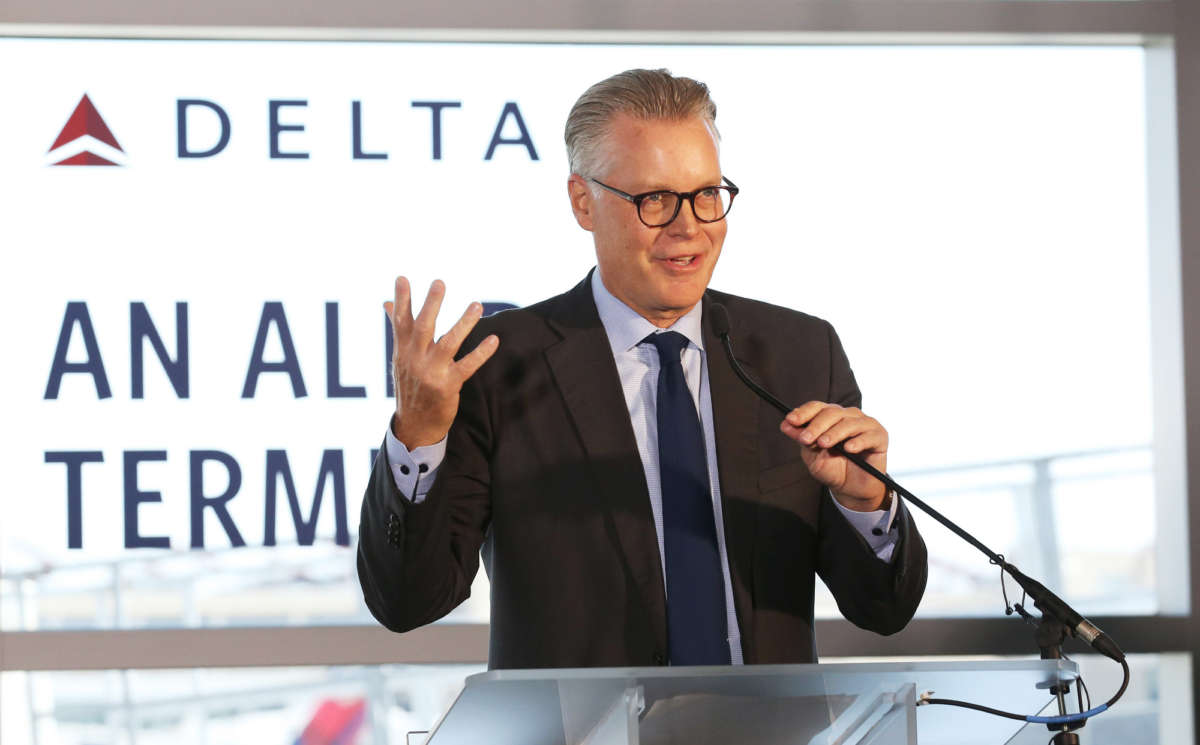This week, both Coca-Cola and Delta Air Lines released statements condemning the recently passed Georgia law that makes it harder to vote and potentially suppresses votes that are cast. The strongly worded statements released by the companies gained them headline after headline about their supposed opposition to the bill.
But the opposition comes too late: Though the bills were discussed, reworked and condemned by voting rights activists for months, the Georgia-based companies only came out with statements opposing them after the omnibus bill was signed into law. What’s more, both companies also had a hand in helping the bills get passed.
While Coca-Cola was running ads last year through Sprite to encourage people, especially Black people, to vote, they were also covertly donating to the Republicans responsible for the recent Georgia bill, reports Popular Information. Since 2018, the company has donated $34,750 to the sponsors of the two large voter suppression bills in the state, provisions of which are now law, and told Popular Information that it believed the bills took a “balanced approach.”
Over the past week, Coca-Cola has faced boycott threats over its failure to stand against the laws. Faced with boycott threats and the backlash from the community, the company quickly changed course.
“This legislation is unacceptable. It is a step backwards, and it does not promote principles we have stood for in Georgia around broad access to voting,” said Coca-Cola CEO James Quincey on CNBC on Wednesday. “We always opposed this legislation.” That claim, of course, is demonstrably untrue.
Delta has done an even more drastic about face on the legislation over the past weeks. The company released a statement the day after the legislation was signed praising the bill and even claiming credit for helping to shape the bill into its final form.
“Delta engaged extensively with state elected officials in both parties to express our strong view that Georgia must have a fair and secure election process, with broad voter participation and equal access to the polls. The legislation signed this week improved considerably during the legislative process,” the company’s CEO, Ed Bastian, wrote. Since 2018, Delta has donated at least $41,600 to the lawmakers who sponsored the voter suppression bills in the legislature, Popular Information reports.
After that statement elicited backlash and a call for a boycott of the airline, Bastian issued a new statement on Wednesday touting the company’s commitment to civil rights and implying that he needed time to understand the full extent of the bill. “I need to make it crystal clear that the final bill is unacceptable and does not match Delta’s values,” Bastian wrote.
These statements will do nothing to change the law or the fact that the companies had had a hand in helping them get passed. The statements will, however, likely ease the minds of some of the people calling for or participating in the boycott — which is almost certainly what the companies are hoping for.
Popular Information found last month that corporations like Walmart, T-Mobile, UPS, AT&T and many others have in all donated $7.4 million to the legislators who sponsored the voter suppression bills in Georgia’s House and Senate since 2018. Some of these companies, like Lyft, pledged to no longer support federal members of Congress who voted to overturn the results of the presidential election, but several companies have already reneged on that promise.
Voting rights activists say that if these companies had come out against the legislation before it was passed, they could have stopped it in its tracks. “Conversations with Black and Brown leaders must happen at all stages and all areas of decision-making, not after the damage is done,” Nse Ufot, CEO of the New Georgia Project, said in a statement.
A group of 72 Black executives released a letter on Wednesday calling on fellow corporate leaders to fight the legislation. “There is no middle ground here,” Kenneth Chenault, former CEO of American Express who led the letter effort, told The New York Times. “You either are for more people voting, or you want to suppress the vote.”
Groups like Major League Baseball (MLB) have threatened boycotts of the state in general, saying that they might pull major events like the 2021 All-Star Game from the state. The MLB recently got President Joe Biden’s support to do so.
But voting rights activist and former Georgia State Rep. Stacey Abrams has said that the companies shouldn’t leave — they should “stay and fight,” she wrote in an op-ed for USA Today. “Georgia corporations should leave behind tepid statements of self-congratulations for turning horrific intent into terrible reality,” Abrams wrote. “Corporations eager to prove their good faith can do so by putting their resources to good use.”
Trump is silencing political dissent. We appeal for your support.
Progressive nonprofits are the latest target caught in Trump’s crosshairs. With the aim of eliminating political opposition, Trump and his sycophants are working to curb government funding, constrain private foundations, and even cut tax-exempt status from organizations he dislikes.
We’re concerned, because Truthout is not immune to such bad-faith attacks.
We can only resist Trump’s attacks by cultivating a strong base of support. The right-wing mediasphere is funded comfortably by billionaire owners and venture capitalist philanthropists. At Truthout, we have you.
Our fundraising campaign is over, but we fell a bit short and still need your help. Please take a meaningful action in the fight against authoritarianism: make a one-time or monthly donation to Truthout. If you have the means, please dig deep.
